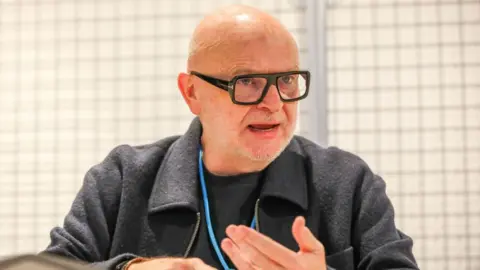Primark boss quits after complaint about behaviour
 Getty Images
Getty ImagesPrimark boss Paul Marchant has resigned following an allegation by a woman about "his behaviour towards her in a social environment".
Associated British Foods (ABF), which owns Primark, said following an investigation by external lawyers, Mr Marchant "acknowledged his error of judgement and accepts that his actions fell below the standards expected" by the business.
Mr Marchant co-operated with the investigation and apologised to the individual, said ABF.
The Primark boss had also been involved in a previous incident involving "inappropriate communication", ABF later confirmed.
The company said that incident had been investigated "some time ago" and that "proportionate action" had been taken.
ABF declined to provide any further details, including whether the incidents involved colleagues or individuals from outside the company. A spokesperson told the BBC this was to protect their identities as much as possible.
'Immensely disappointed'
Mr Marchant became chief executive of Primark in 2009, taking over from the firm's founder Arthur Ryan.
In announcing Mr Marchant's resignation, George Weston, chief executive of ABF, said: "I am immensely disappointed. Colleagues and others must be treated with respect and dignity. Our culture has to be, and is, bigger than any one individual."
He added: "At ABF, we believe that high standards of integrity are essential. Acting responsibly is the only way to build and manage a business over the long term."
The company said it remains in contact with the individual "who rightly raised her concerns and have offered her our support".
While Primark - or Penneys as it is known in Ireland - has been around since 1969 when Mr Ryan opened the first shop in Dublin, it began ramping up its overseas expansion under Mr Marchant's leadership.
Its low-price clothing and rapidly changing stock won over cash-strapped but fashion-conscious younger customers. Although, according to Catherine Shuttleworth, retail analyst at the consultancy Savvy, it has got "ubiquitous appeal".
She said: "It has allowed access to affordable clothing for everybody and that has tied into a period of time where global supply chains have significantly changed, so that means you can access products and materials better and more easily."
Prior to Primark, Mr Marchant worked for a number of retailers such as Debenhams, Topman and New Look. But, like his predecessor Mr Ryan, he has remained out of the spotlight.
Ms Shuttleworth said Primark's leadership "flies under the radar a bit because - it sounds a bit cheesy - they let their shops and their products do the talking".
Unlike many of its rivals, Primark resisted selling its products online before finally relenting in 2022 after Covid restrictions drove people to internet shopping. Even then, Primark only launched a click-and-collect service as opposed to offering deliveries.
Like other low-cost fashion chains, Primark has been criticised for producing cheap, throwaway clothing.

In a rare interview, Mr Marchant told the BBC in 2022: "We have worked so hard and continue to work hard on ensuring that we're improving the quality and the durability of our clothing.
"We don't want customers to buy something and then discard it. We want them to buy, love and keep it in their wardrobe [and] hand it down to their friends."
'Unsettling'
Primark is a key part of the wider ABF business, contributing nearly half of the group's overall sales of £20bn.
However, in its most recent trading update covering the Christmas period, Primark reported a fall in sales for the UK and Ireland, which accounts for 45% of the retailer's revenues.
ABF's share price fell by nearly 4% to £18.64 after Monday's announcement.
Susannah Streeter, head of money and markets at Hargreaves Lansdown, said Mr Marchant's departure came at a trying time for Primark.
''The change at the top will be unsettling particularly given that Primark delivered a very mixed bag of results at the last count," she said.
"This leadership upset comes amid weaker consumer sentiment which has meant footfall at its stores has fallen - and the chain has been losing market share in the UK."
She said that internationally the company has performed well, but added: "There could be uncertainty ahead about the speed of expansion given the change of boss."
Following Mr Marchant's "immediate" departure, ABF's finance director Eoin Tonge will become Primark's interim chief executive.
The firm's financial controller, Joana Edwards, will step into Mr Tonge's role. The company said: "Both executives have the experience to perform these roles well."
ABF is majority-owned by the billionaire Weston family who, until 2021, owned the department store Selfridges.
